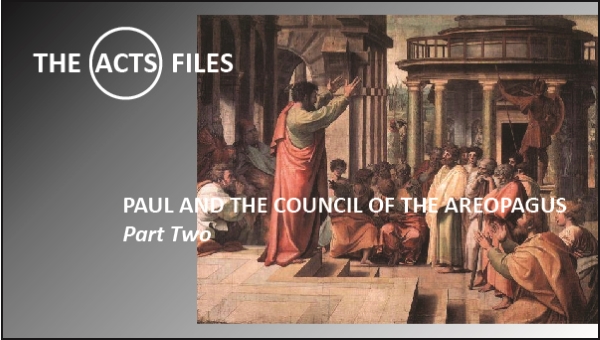By Tyson Thorne

Paul stands before the council of the Areopagus (Acts 17.22-.31) and gives his opening remarks about his belief system. Throughout the speech we see evidence of Paul’s cleverness and command of the Greek language. Take the back-handed compliment he gives his listeners in his very first statement for example. He states that he has observed they are a very “religious” people. The Greek word translated religious can be interpreted as “devout” (a compliment) or as “superstitious” (an insult).
Next, Paul brings in an element of their culture, an alter he found in the city that was not devoted to any god, but rather to “an unknown god.” If anything the Greeks liked to cover their bases. By bringing in this element Paul legitimizes his beliefs; the council cannot accuse him of worshiping an unapproved deity without criminalizing their own alter to the unknown. Even if the Jewish rabbis that have followed him from Philippi caught up to him in Athens, their argument regarding the legality of Paul’s faith would fall on deaf ears.
Seizing the opportunity, Paul continues to describe to the audience the God of heaven and earth. The Greek gods and goddesses were oppressive, fallen and often used humanity to further their own agendas. The gods required prayers and subservience. The God of Paul on the other hand, is not to be found in temples or have any need of humanity. In fact the opposite is true: humanity needs God! For God alone created life and the elements needed to keep on living. Every breath we take is a result of God’s provision and should he choose to no longer provide for us we all die. While we are dependent upon God, he is not cruel or mischievous, but loving and generous.
God’s authority is also absolute. He created all men and nations when he created the first man, for all men descend from Adam (while Adam is not named in Paul’s discourse he is clearly in view). Not only has God created humanity and all the nations, he also sets limits on the lifespan of each person, and the boundaries of human civilization.
God is also different from Greek gods in that he has a purpose. The Greek gods and goddesses were whimsical beings capable of generosity in one instance and intense cruelty the next. Their actions were a result of emotion rather than discipline and purpose. Paul’s God on the other hand, provides for mankind with intention. God’s purpose in his provision is to inspire humanity to search him out, to feel around or grope for him. Although unknown to the Greeks, God has promised many times that those who seek him he will allow to find him. This is God’s intention.
Paul borrows another cultural mainstay of the Greeks and quotes from one of their famed poet philosophers, Aratus, who lived about 300 years before Paul’s visit to Athens. Paul reveals his cleverness yet again by quoting Aratus. First, it is difficult for the Athenians to dispute something one of their own philosophers adhered to. Second, by tying his God to an ancient Greek philosopher the Greeks could not reject Jesus out of hand as something new. Third, Paul uses the poet’s words to discredit their acts of idol worship.
The conclusion of Paul’s discourse brings it all home. While God willingly overlooked humanities idol worship and false deities, he was now calling every nation to turn to him. Why now? Because with Jesus’s resurrection from the dead God has revealed humanities judge and the timer has begun counting down to man’s judgment day. Time is running out, and it is time for all people everywhere to seek God.
|
|
|
